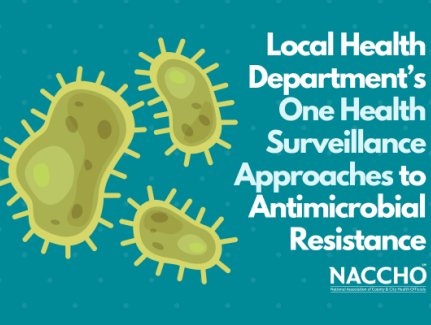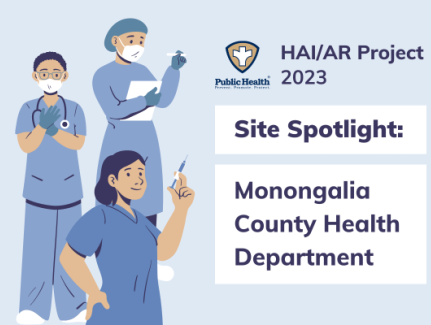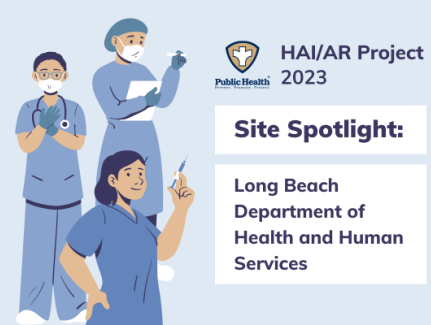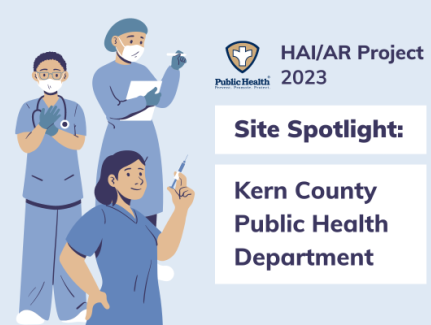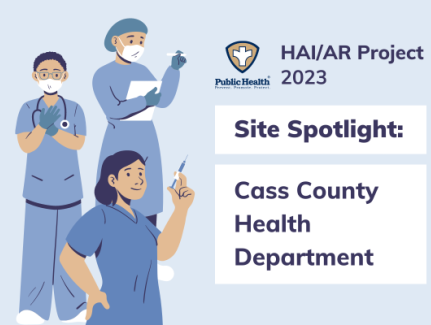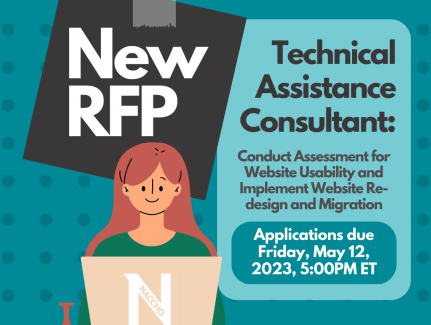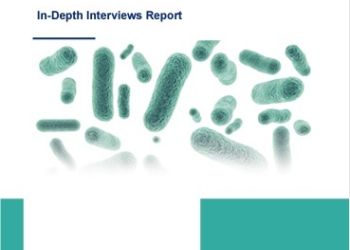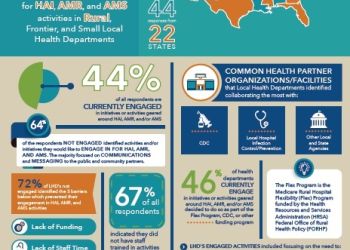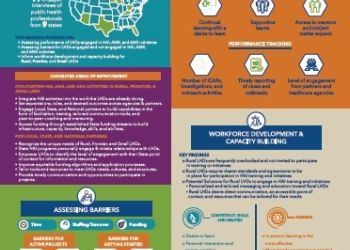- Programs
- Community Health
- Infectious Disease
- Infectious Disease Prevention and Control
- Healthcare-Associated Infections & Antimicrobial Resistance
Healthcare-Associated Infections & Antimicrobial Resistance

NACCHO supports local health departments (LHDs), which serve as chief community health strategists, to advocate and promote the growing role of LHDs in Healthcare-associated infections (HAIs) and Antimicrobial resistance (AR) prevention and response and strengthen their capacity to prevent and control HAI/ARs.
Sign up for NACCHO's Transmission Digest e-newsletter for a monthly digest of news, tools, and resources related to infectious disease and immunization.
Latest HAI/AR News
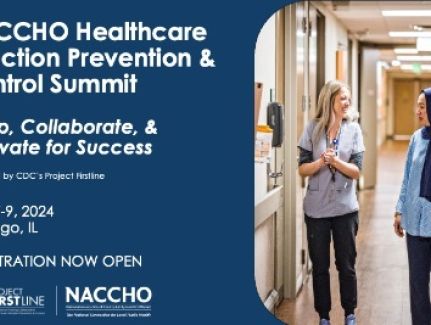
Community Health
NACCHO’s Healthcare Infection Prevention and Control...
The NACCHO Healthcare IPC Summit, supported by CDC Project Firstline, aims to foster collaboration among local, state, territorial, and tribal health departments, as well as...
Feb 14, 2024 | Jaclyn Abramson
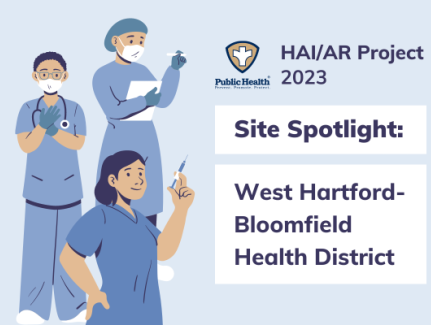
Community Health
HAI/AR Prevention and Response Spotlight: West...
We asked our HAI/AR pilot project sites to reflect on their experiences and lessons learned since joining our project. Here is what one of our sites, West Hartford-Bloomfield...
Aug 28, 2023
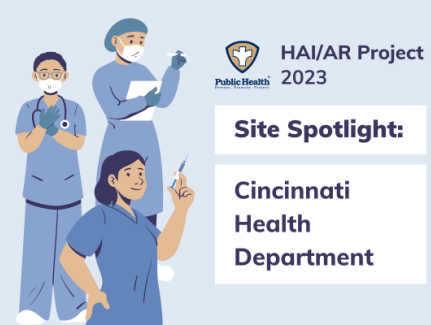
Community Health
HAI/AR Prevention and Response Spotlight: Cincinnati...
We asked our HAI/AR pilot project sites to reflect on their experiences and lessons learned since joining our project. Here is what one of our sites, the Cincinnati Health...
Aug 18, 2023
NACCHO developed several tools and resources to help local health departments prevent and control HAIs, including:
| Title | Description | Resource Type |
|---|---|---|
| Value and Evidence Base for Universal Decolonization in Nursing Homes | Implementation of a universal decolonization strategy resource | Fact Sheet |
| Implementing Decolonization in Nursing Homes | Process to launch universal decolonization strategy in nursing homes resource | Fact Sheet |
| UCI Health - SHIELD: Eliminating multidrug-resistant organisms | Nursing home toolkit for the implementation of a universal decolonization strategy | Toolkit |
| Containing Multi-Drug-Resistant Organisms in a Long-Term Acute-Care Hospital | Learn how, in response to a novel “superbug” discovered at a long-term acute-care hospital, the Florida Department of Health in Orange County responded rapidly to contain the outbreak and create tools for future use. | CDC Field Notes |
| CDC’s New Antibiotic Resistance Threats Report Shows Persistent Problem | Read NACCHO's response to the CDC's Antibiotic Resistance Threats Report, 2019. | Press Release |
| NACCHO HAI Initiatives | Learn about NACCHO’s healthcare-associated infection projects and initiatives. | Fact Sheet |
| Antimicrobial Resistance & Stewardship: Local Efforts on a Global Issue | Learn how NACCHO and its members are working to address antimicrobial resistance and promote antibiotic stewardship. | Fact Sheet |
| The Role of Local Health Departments in Combating Healthcare-Associated Infections | This engaging two-minute video offers an overview of the potential role(s) local health departments can play in addressing HAIs at the community level. | Video |
| Healthcare-Associated Infections: A Toolkit for Local Health Departments | Developed in coordination with demonstration sites from NACCHO’s Lessons in INfection Control (LINC) program, this toolkit provides local health departments with guidance, best practices, tools, and resources for expanding activities related to improving local infection control, preparedness, and response. | Toolkit |
| Lessons in Infection Control: The Role of Local Health Departments in Prevention, Preparedness, and Response | Published in the Journal of Public Health Management and Practice, this article summarizes the findings from NACCHO's LINC Initiative, which funded demonstration sites to enhance coordination in health care and community settings to improve infection control preparedness and response efforts across the nation. | Journal Article |
| Local Health Department Engagement in Health Care–Associated Infection and Antibiotic Resistance Work | Published in the Journal of Public Health Management and Practice, this article highlights results from NACCHO's Local Health Department Healthcare-Associated Infections and Antibiotic Stewardship Assessment. | Journal Article |
| Name | Date | Description |
|---|---|---|
| Leveraging Lessons Learned from the SHIELD OC Program to Inform LHD Implementation of a Universal Decolonization Strategy | 3/16/2023 | Dr. Susan Huang from the University of California, Irvine (UCI) discussed the UCI team’s experience working with 38 healthcare facilities, including 17 hospitals, 18 nursing homes, and 3 long-term acute care facilities that adopted the decolonization strategy. Dr. Huang provided a brief overview of their work, previously discussed on the October 26, 2022 webinar and then focused on strategies and lessons learned. This webinar explored a potential future opportunity for LHD’s to work with Dr. Huang’s team to implement this type of intervention. |
| Implementation of a Universal Decolonization Strategy through the SHIELD OC Program to Combat MDROs | 10/26/2022 | The Shared Healthcare Intervention to Eliminate Life-Threatening Dissemination of multidrug-resistant organisms (MDROs) in Orange County (SHIELD OC) Program, was a CDC-funded public health regional decolonization collaborative to combat the spread of endemic and emerging MDROs across healthcare facilities in Orange County, California. In this webinar, Dr. Susan Huang from the University of California, Irvine (UCI) discusses the UCI team’s experience working with 38 healthcare facilities, including 17 hospitals, 18 nursing homes, and 3 long-term acute care facilities that adopted the decolonization strategy. This program significantly reduced MDROs and resulted in large reductions in the proportion of nursing home residents hospitalized for infection. NACCHO is supporting UCI’s dissemination efforts to train other nursing homes to adopt this effective strategy through its Healthcare-Associated Infection and Antibiotic Resistance (HAI/AR) demonstration site program. |
| Strategies for Building and Maintaining Relationships with Nursing Homes to Reduce MDROs and COVID-19 Case Burden | 7/20/21 | Dr. Susan Huang from the University of California, Irvine (UCI) discusses the UCI team’s experience working with 27 nursing homes in Orange County, California to implement the Shared Healthcare Intervention to Eliminate Life-Threatening Dissemination of multidrug-resistant organisms in Orange County (SHIELD OC) Program. NACCHO is supporting UCI through its Healthcare-Associated Infection and Antibiotic Resistance (HAI/AR) demonstration site project. |
| Antibiotic Stewardship and Sepsis: A Balancing Act | 1/15/2020 | Hosted in December 2019 by Sepsis Alliance, this webinar presented an overview of antibiotic stewardship and recent research regarding antibiotic treatments and sepsis care. Speakers discussed strategies to prevent antibiotic resistance and provide optimal care for sepsis patients; presented the latest CDC guidance and new research on antibiotic stewardship, and shared antibiotic stewardship program experience in hospital settings. |
| Clinical and Public Health Partnerships for Antibiotic Stewardship | 8/15/19 | As conveners and chief health strategists in their communities, local health departments (LHDs) can be a valuable partner in supporting the adoption of antimicrobial stewardship practices in these and other settings. This webinar showcased a partnership between Los Angeles County + USC Medical Center (LAC+USC) and Los Angeles County Department of Public Health. Speakers discussed how the partnership was established and maintained, how it has improved stewardship efforts, challenges and lessons learned, and recommendations for other local health departments and essential hospitals interested in pursuing a similar partnership. |
| Local Health Department Role in Containment of Novel Resistance | 6/20/2019 | As issues with drug resistant pathogens have emerged across the country, local health departments (LHDs) have been called on to lead and support the containment of novel or targeted multidrug-resistant organisms (MDROs). To explore this role, NACCHO hosted a webinar to share the experiences of three LHDs who have been affected by containment events. |
| Introduction to Social Network Analysis: Broad Overview and a Demonstration of a Novice’s Guide Using R Statnet | 6/28/2018 | NACCHO hosted a webinar on conducting social network analyses, including what they look like and how they can be applied. Webinar participants were also led through an explanation and live demonstration of a recently developed toolkit from the Florida Department of Health in Orange County, A Novice’s Guide: Social Network Analysis Using R Statnet, which includes basic terminology and steps for conducting a social network analysis using free data analysis software. |
| Local Health Department Access to the National Healthcare Safety Network | 1/24/2018 | NACCHO hosted a webinar to discuss the National Healthcare Safety Network (NHSN) —the nation’s most widely used healthcare-associated infection (HAI) tracking system— and upcoming changes to data use agreements that may impact how local health departments can more easily access NHSN data. Speakers included CDC representatives, and staff from the Los Angeles County Department of Public Health and the Philadelphia Department of Public Health, both of whom shared the process they used to gain access to NHSN data, lessons learned, strategies for success, and current and future uses for the data. |
In an effort to highlight the role of NACCHO and local health departments in addressing issues related to healthcare-associated infections, NACCHO periodically develops feature articles. Check out the latest below:
| TITLE | DESCRIPTION | DATE |
|---|---|---|
| ELC Directly Funded Cities Share Resources for Addressing Antimicrobial Resistance and Healthcare-Associated Infections | Healthcare-associated infections (HAIs) occur in about one out of every 31 hospital patients. Antimicrobial resistance (AMR) is a major public health threat which compounds the challenge of HAIs. Antibiotic-resistant infections cause over 35,000 deaths each year and nine of the top 18 infections considered to be the highest antibiotic-resistance threats are often associated with healthcare settings. | 11/21/2019 |
| Developing Regional Antibiograms to Monitor Resistance Patterns | Antimicrobial resistance is a growing threat to the public’s health, and local health departments (LHDs) have become increasingly involved to ensure their communities are prepared. LHDs serve as community chief health strategists and are uniquely positioned to facilitate a coordinated approach across healthcare settings, enhancing infection prevention and control, responding to antimicrobial resistant infections, and promoting antimicrobial stewardship | 11/18/2019 |
| Containing an MDRO: Tools Developed During a Response | When a novel or targeted multi-drug resistant organism (MDRO) or resistance mechanism is identified, local public health must act quickly to prevent its spread, implementing CDC’s Containment Strategy. | 10/24/2019 |
| Against Antimicrobial Resistance: A Local Commitment to Fighting a Global Threat | As the threat of antimicrobial resistance (AMR) grows and affects human, animal, and environmental health, a multidisciplinary One Health approach and antimicrobial stewardship (AMS) efforts across these settings are necessary to optimize outcomes for patients, populations, and communities as a whole. | 12/05/2018 |
| Leveraging Local Knowledge and Expertise to Tackle Healthcare-Associated Infections | Local health departments (LHDs) are on the frontline of this work and serve as a vital part of the solution by facilitating coordinated approaches to interrupt the spread of HAIs. | 08/07/2017 |
| Certification in Infection Control: Local Impact and Strategies for Success | Healthcare-associated infections (HAIs) are a persistent and growing threat to the health of communities. To meet this threat head-on, more local health departments (LHDs) are building their capacity for HAI prevention and response. Enhancing LHD capacity can involve a wide variety of activities such as conducting exercises that test response plans, strengthening connections with healthcare partners to improve collaboration, and participating in formal training and professional development opportunities that build subject matter expertise. | 06/13/2018 |
| International Infection Prevention Week 2017: Local Approaches to Combating Antibiotic Resistance | In recognition of the need for urgent response and the power of sharing information, the Association for Professionals in Infection Control and Epidemiology (APIC) is dedicating this year’s International Infection Prevention Week (IIPW), October 15-21, 2017, to raising awareness around antibiotic resistance (AR) and the roles of healthcare providers, public health professionals, and patients in combatting AR. | 10/19/2017 |
| National Handwashing Week 2017: The Power of Preventative and Primary Intervention | As young children, we heard this message often. Parents, teachers, and other well-meaning adults reinforced this hand hygiene mantra: before mealtimes, after bathroom visits, and when we had the sniffles or coughs. | 12/08/2017 |
Blog Series: Antimicrobial Resistance & Global Health Security
| TITLE | DESCRIPTION | DATE |
|---|---|---|
| The State of Disease Surveillance | Due to the continued application and overuse of antimicrobials, antimicrobial resistance – which includes resistance among bacteria, parasites, viruses, and fungi – is a growing threat to human health and an increasingly critical component of the Global Health Security Agenda. This blog series will explore monitoring and measurement systems for antimicrobial use and resistance, the importance of local health departments in tackling the emergence and spread of antimicrobial-resistant organisms, and opportunities to strengthen surveillance at the local level. | 11/06/2016 |
| Collaborative Efforts in Disease Surveillance (Part 1) | Last week, NACCHO outlined the landscape of disease surveillance and highlighted the importance of local public health agencies as early detectors of infectious disease threats. Revisit the first blog post in this series for a full account. In today’s post, we present the efforts of two local health departments using surveillance to protect communities from antimicrobial resistance. | 11/7/2016 |
| Collaborative Efforts in Disease Surveillance (Part 2) | So far in this blog series, NACCHO has explored how disease surveillance can combat antimicrobial resistance and highlighted how local health departments can play a role in protecting communities from this public health threat. In this final post, we provide additional cases of how local public health can serve as a key partner in the fight to contain and prevent this global public health issue. | 11/10/2016 |
The below stories were written by local health department staff to share their first-hand experiences addressing issues related to healthcare-associated infections:
- Florida Epidemiologists Combat HAIs by Becoming CIC® Certified — Florida Department of Health in Orange County
- Allegheny County Health Department Assesses Antibiotic Stewardship — Allegheny County (PA) Health Department
- The Evolving Role of Local Public Health in Promoting Safe Healthcare — Houston (TX) Health Department
NACCHO projects support and build workforce capacity for Local Health Departments (LHDs) and recognize that opportunities and challenges in rural, frontier, and small settings may be unique. If you are a Rural, Frontier or Small LHD, please join the Rural Café, Rural-Frontier LHD Projects or NACCHO’s Small LHD Virtual Community to receive information specific to your unique needs and to share knowledge and collaborate. LHD’s may sign up directly for the Rural Café with Victoria Freire at [email protected].
The resources below are specific to help Rural, Frontier, and Small LHDs prevent HAIs, AMRs, and/or AMSs.

The Council for Outbreak Response: Healthcare-Associated Infections (HAIs) and Antimicrobial-Resistant Pathogens (AR) works to improve practices and policies at the local, state, and national levels for the detection, investigation, control, and prevention of HAI/AR outbreaks across the healthcare continuum. CORHA is a multidisciplinary collaboration of national associations and federal agencies working together since 2015 to improve methods to detect, investigate, control and prevent HAI/AR outbreaks. NACCHO is a founding member and has representation on the governance committee.
CORHA has a suite of resources, including condition or event-specific reference tools, such as thresholds for reporting, tools for investigation, and suggestions for standardized control measures.
Click here to subscribe to the CORHA mailing list for updates on new products, resources, news, and more!
The resources below have been developed by the NACCHO team to help your local health department prevent healthcare-associated infections.
NACCHO has several policy statements related to HAI/AR to help guide local health department practice.
Community Health Program
Christina Baum
Director, Infectious Disease
JavaScript is required to reveal this message. / Email
Community Health Program
Candice Young
Senior Program Analyst, Infectious Disease
JavaScript is required to reveal this message. / Email
Community Health Program
Jaclyn Abramson
Senior Program Analyst, Infectious Disease
JavaScript is required to reveal this message. / Email
Community Health Program
Kimberly Nalley
Senior Program Analyst, Infectious Disease
JavaScript is required to reveal this message. / Email
Community Health Program
Trent Johnson
Program Analyst, Infectious Disease
JavaScript is required to reveal this message. / Email
Community Health Program
Irene Halferty
Communication Specialist, Infectious Disease
JavaScript is required to reveal this message. / Email
